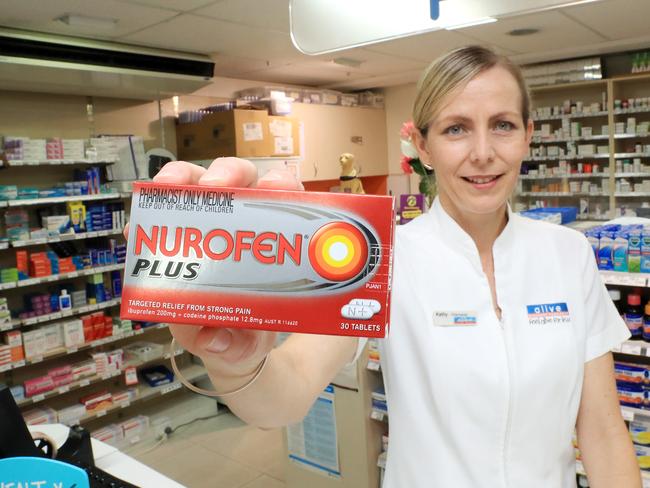Codeine prescriptions: Why you will pay more for pain relief
MILLIONS of Australians who take popular pain medications could be hit with rising costs in the fallout from the new prescription-only rule for codeine products.
Health
Don't miss out on the headlines from Health. Followed categories will be added to My News.
EXCLUSIVE
MILLIONS of Australians may have to pay several dollars more for popular pain medications from today, as fallout from the Government’s new prescription only rule for codeine products begins.
Some of the most popular codeine containing over the counter medicines Panadeine, Nurofen Plus, Panafen Plus, Panadeine Rapid Soluble and Panadeine Extra, and Demazin and Codral cold and flu capsules have been withdrawn from sale by pharmaceutical companies as a result of the rule change.
There are still 41 bands of low dose codeine products available in Australia but consumers will need to get a doctor’s prescription to access the pills and they will not be subsidised on the Pharmaceutical Benefits Scheme.
GUIDE: How the codeine change will affect you
MORE: Prescription drug changes could increases overdoses

Now the pills are prescription only. chemists will be able to charge a dispensing fee for supplying the drugs that will raise their price.
The dispensing fee for PBS medicines is around $7 per pack but chemists can decide to set their own dispensing fee for private scripts, some may not charge one at all.
Industry insiders are predicting in the long run all low dose codeine products could disappear from the market as happened when antihistamines for children aged under two became prescription only.
The nation’s medicines watchdog has moved to make the drugs prescription only because around 100 people a year are killed by overdoses, they are not effective for chronic pain and codeine is addictive.
Not recommended for use for longer than three days at a time, many Australians are taking codeine every day and at dangerously high doses of up to 28 pills a day.
PRESCRIPTION MEDICATION: The secret addiction
REFORMED ADDICT: They are ‘just as bad as heroin’

Head of Pain services at Royal Melbourne Hospital Dr Malcolm Hogg says codeine is not a good pain reliever, the body adapts to it and patients need to take more to get relief.
If taken for extended periods, it can provoke a withdrawal pain problem where not taking the drug is the reason for the pain rather than any physical symptom, he says.
People reliant on low dose over the counter codeine products are being told to seek advice from their doctor on better ways to manage their pain.
Combination ibuprofen and paracetamol tablets, still available without a prescription, provide better pain relief than low dose codeine tablets but they can’t be used by everybody, Dr Hogg says.
It’s estimated around 500,000 Australians are addicted to low dose codeine pills, many may not even be aware they have a problem.
The Therapeutic Goods Administration warns some of these people may experience withdrawal symptoms if they can’t access codeine and symptoms include head and muscle aches, mood swings, insomnia, nausea and diarrhoea.
The medicines watchdog’s website has advice for people unsure what to do as a result of the change.
Pain Australia is calling on the government to fund a national pain strategy that will subsidise better ways of managing chronic pain including physiotherapy, exercise, massage and psychological support.
Pain Australia CEO Carol Bennett says there are only 200 pain specialists in Australia, very long waiting lists for access to too few pain clinics and no subsidies for pain treatments that don’t involve medications.
RACGP president Dr Bastian Seidel says Australians need to start moving away from medication to treat chronic pain and look at physiotherapy, acupuncture, massage, exercise treatment, heat and ice as alternatives.
The Pharmacy Guild is urging state and federal governments to introduce a real time recording system for opioid prescriptions to enable doctors and pharmacists to be aware if patients are ‘doctor shopping’ or otherwise accessing too much codeine.



